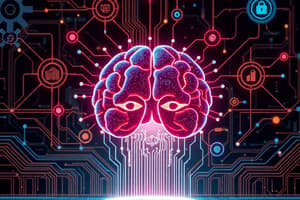Podcast
Questions and Answers
AI will inevitably become self-aware and pose a threat to humanity.
AI will inevitably become self-aware and pose a threat to humanity.
False (B)
The term 'artificial intelligence' was first coined in 1956 by John McCarthy, an English computer scientist.
The term 'artificial intelligence' was first coined in 1956 by John McCarthy, an English computer scientist.
True (A)
Deep learning is a type of machine learning that is inspired by the structure and function of the human brain's neural networks.
Deep learning is a type of machine learning that is inspired by the structure and function of the human brain's neural networks.
True (A)
AI will replace all human jobs, leading to mass unemployment.
AI will replace all human jobs, leading to mass unemployment.
Machine learning allows computers to learn and improve from experience without being explicitly programmed.
Machine learning allows computers to learn and improve from experience without being explicitly programmed.
The first AI program, called Logic Theorist, was developed in 1956 by an American computer scientist.
The first AI program, called Logic Theorist, was developed in 1956 by an American computer scientist.
AI can fully understand human emotions and intentions.
AI can fully understand human emotions and intentions.
AI algorithms power recommendation systems used by companies like Netflix, Amazon, and Spotify to personalize user experiences.
AI algorithms power recommendation systems used by companies like Netflix, Amazon, and Spotify to personalize user experiences.
AI is already used in various industries, including healthcare, finance, transportation, and entertainment.
AI is already used in various industries, including healthcare, finance, transportation, and entertainment.
AI advancements will inevitably lead to a dystopian future.
AI advancements will inevitably lead to a dystopian future.
AI is only accessible to large tech companies and governments.
AI is only accessible to large tech companies and governments.
AI systems are always unbiased and objective.
AI systems are always unbiased and objective.
AI can fully understand human emotions and intentions.
AI can fully understand human emotions and intentions.
AI will never make mistakes or errors.
AI will never make mistakes or errors.
Flashcards are hidden until you start studying
Study Notes
Introduction to Artificial Intelligence
- The term "artificial intelligence" was first introduced in 1956 by John McCarthy, a prominent English computer scientist.
Machine Learning and Deep Learning
- Machine learning enables computers to learn from experience and improve performance without explicit programming.
- Deep learning is a specialized form of machine learning that mimics the neural networks of the human brain.
Historical Milestones in AI
- The first AI program, known as Logic Theorist, was also developed in 1956 by an American computer scientist.
Impact on Employment
- There are concerns that AI will replace human jobs entirely, potentially leading to widespread unemployment.
Emotional Intelligence and AI
- Contrary to some beliefs, AI is not capable of fully understanding human emotions and intentions.
Applications of AI
- AI algorithms are utilized in recommendation systems for platforms like Netflix, Amazon, and Spotify, enhancing user personalization.
- Various industries employing AI include healthcare, finance, transportation, and entertainment.
Societal Concerns
- Advancements in AI raise fears about a potential dystopian future driven by technology.
- Access to AI technologies is primarily limited to large tech companies and government entities, raising ethical and accessibility questions.
Myths about AI
- Common misconceptions include the belief that AI systems are always unbiased and objective and that they will never make mistakes or errors.
Studying That Suits You
Use AI to generate personalized quizzes and flashcards to suit your learning preferences.




